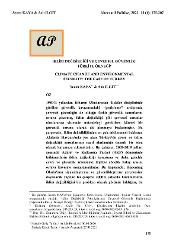| dc.description.abstract | 1980’li yıllardan itibaren Uluslararası İlişkiler disiplininde görülen güvenlik kavramındaki “genişleme” aralarında çevresel güvenliğin de olduğu farklı güvenlik tanımlarını ortaya çıkarmış, iklim değişikliği gibi çevresel sorunlar uluslararası sistemde mücadeleyi gerektiren küresel bir güvenlik sorunu olarak ele alınmaya başlanmıştır. Bu çerçevede, iklim değişikliğinden en çok etkilenmesi beklenen Akdeniz Havzası’nda yer alan Türkiye’de çevre ve iklim değişikliği sorunlarının nasıl algılandığı önemli bir soru olarak karşımıza çıkmaktadır. Bu çalışma, 2002-2019 yılları arasında Adalet ve Kalkınma Partisi (AKP) döneminde hükümetlerin iklim değişikliği konusuna ve daha genelde çevre ve güvenlik arasındaki ilişkiye yönelik bakış açısını ortaya koymayı amaçlamaktadır. Bu kapsamda, Kopenhag Okulu’nun siyasallaştırma ve güvenlikleştirme çerçevesine dayanarak yapılan bu çalışma 2000’li yıllarda hükümetlerin iklim değişikliğini bir problem olarak görünür kıldığını, bu sorunla ilgili idari, kurumsal ve siyasi girişimlerde bulunarak sınırlı da olsa sorumluluk üstlendiğini ve konuyu ağırlıklı olarak sürdürülebilir kalkınma ile birlikte ele aldığını, dolayısıyla iklim değişikliğini güvenlikleştirmek yerine siyasallaştırdığını savunmaktadır.
Since the 1980s, in International Relations discipline the “widening” of the concept of security led to several definitions, including environmental security, and the understanding of environmental problems such as climate change as a global security issue that requires joint efforts in the international system. Given the projections of the Mediterranean Basin to be one of the most affected regions by climate change, understanding Turkey’s perception and policies regarding environmental problems and climate change is important. This paper, thus, examines Turkey’s approach to climate change during the period from 2002 to 2019 under the Justice and Development Party rule. By drawing on the Copenhagen School’s politicization/securitization framework, this study claims that throughout the 2000s Turkish governments have made climate change visible as a problem, developed administrative, institutional and political initiatives, taken on responsibilities, albeit limited, and addressed climate change predominantly within the sustainable development framework, thereby politicized rather than securitized climate change. | en_US |
















